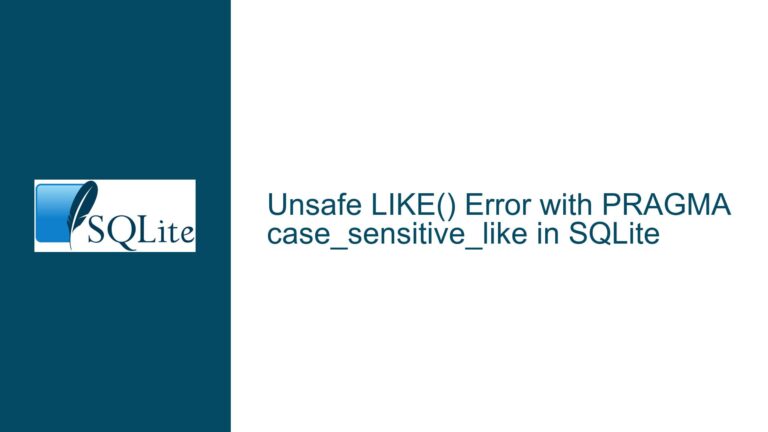Custom Collation Failure in SQLite Due to Python String Comparison Behavior
Issue Overview: Custom Collation Not Respecting Natural Order in SQLite Queries
The core issue revolves around a custom collation function implemented in Python for use with SQLite. The collation function, ordonner_question, is designed to sort question identifiers in a specific natural order (e.g., q1, q2, q10, q20.a, q20.b, etc.). However, after an upgrade of SQLite and Python, the collation function no longer produces the expected results when used in SQLite queries. Specifically, the query results show q10 appearing before q3, which violates the intended natural sorting order.
The collation function relies on a custom Python class, StringOrInt, which inherits from str and overrides the __lt__ method to compare strings as numbers if they are numeric, and as strings otherwise. The issue arises because the collation function uses the > operator, which does not leverage the overridden __lt__ method in the StringOrInt class. Instead, it falls back to the default __gt__ method of the str class, leading to incorrect comparisons and, consequently, incorrect sorting.
This behavior is particularly problematic because it was not observed in earlier versions of SQLite and Python, suggesting that the issue may be related to changes in how Python handles comparison operators or how SQLite interacts with custom collation functions. The problem is exacerbated when SQLite uses an index to optimize the query, as the index may not respect the custom collation order, further complicating the issue.
Possible Causes: Python String Comparison Behavior and SQLite Index Usage
The root cause of the issue lies in the interaction between Python’s string comparison behavior and SQLite’s query optimization strategies. Specifically, the following factors contribute to the problem:
Incomplete Implementation of Comparison Operators in
StringOrIntClass: TheStringOrIntclass overrides the__lt__method but does not override the__gt__method. When the collation function uses the>operator, Python falls back to the default__gt__method of thestrclass, which performs a lexicographical comparison rather than the intended natural order comparison. This leads to incorrect results when comparing strings likeq10andq3.SQLite Index Usage and Collation Order: SQLite may use an index to optimize the query, especially when the
ORDER BYclause is used. However, the index may not respect the custom collation order, leading to incorrect sorting. This is evident when the query is executed with theNOT INDEXEDhint, which forces SQLite to perform a full table scan and apply the custom collation function correctly, resulting in the expected order.Changes in Python or SQLite Behavior: The issue may have been introduced due to changes in how Python handles comparison operators or how SQLite interacts with custom collation functions. For example, earlier versions of Python may have behaved differently when comparing objects with overridden
__lt__methods, or SQLite may have changed how it handles custom collations when using indexes.Transitivity of Comparison Operations: The collation function must ensure that the comparison operations are transitive, meaning that if
A < BandB < C, thenA < C. If the collation function violates this property, the sorting results may vary depending on the order of comparisons, leading to unexpected results. While the collation function in question appears to be transitive, the incorrect use of the>operator undermines this property.
Troubleshooting Steps, Solutions & Fixes: Correcting the Collation Function and Query Optimization
To resolve the issue, the following steps can be taken:
Implement the
__gt__Method in theStringOrIntClass: TheStringOrIntclass should override the__gt__method to ensure that all comparison operations use the custom logic. The__gt__method can be implemented as follows:def __gt__(self, other): return other.__lt__(self)This ensures that the
>operator uses the custom__lt__logic, maintaining consistency in comparisons.Rewrite the Collation Function to Avoid Reliance on
>Operator: Alternatively, the collation function can be rewritten to avoid using the>operator altogether. Instead, it can use the__lt__method directly to perform comparisons. For example:if q2 < q1: return 1This approach ensures that the custom comparison logic is always used, regardless of the operator.
Force SQLite to Ignore Indexes for Specific Queries: If the issue is related to SQLite using an index that does not respect the custom collation order, the
NOT INDEXEDhint can be used to force SQLite to perform a full table scan. This ensures that the custom collation function is applied correctly. For example:SELECT question, item FROM mp_opt_dec_struct NOT INDEXED ORDER BY question COLLATE ordonner_quest, item;This approach may result in slower query performance but guarantees the correct sorting order.
Use a Different Collation Mechanism: If the custom collation function cannot be fixed or if the performance impact of disabling indexes is unacceptable, consider using a different collation mechanism. For example, SQLite provides built-in collations like
BINARY,NOCASE, andRTRIM, which may be sufficient for some use cases. Alternatively, a custom collation can be implemented directly in SQLite using its C API, avoiding the complexities of Python string comparison behavior.Test and Validate the Collation Function: After making changes to the collation function, it is essential to test and validate its behavior thoroughly. This includes testing edge cases, such as comparing strings with different lengths, strings with numeric and non-numeric parts, and strings with special characters. Additionally, the collation function should be tested with different versions of Python and SQLite to ensure compatibility.
Consider Using a Natural Sort Extension: If the primary goal is to achieve natural sorting (e.g.,
q1,q2,q10), consider using a natural sort extension for SQLite. Several extensions provide natural sorting capabilities, such as theuintcollation mentioned in the discussion. These extensions can simplify the implementation and avoid the pitfalls of custom collation functions.
By addressing the issues with the custom collation function and understanding how SQLite interacts with indexes and collations, the problem can be resolved, ensuring that queries return results in the expected order.






